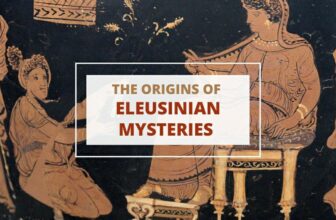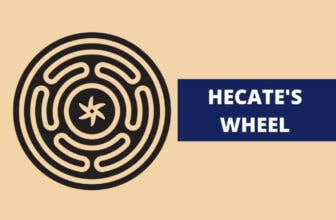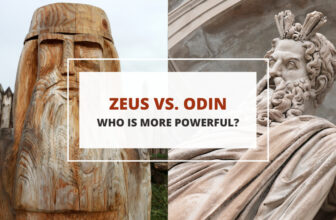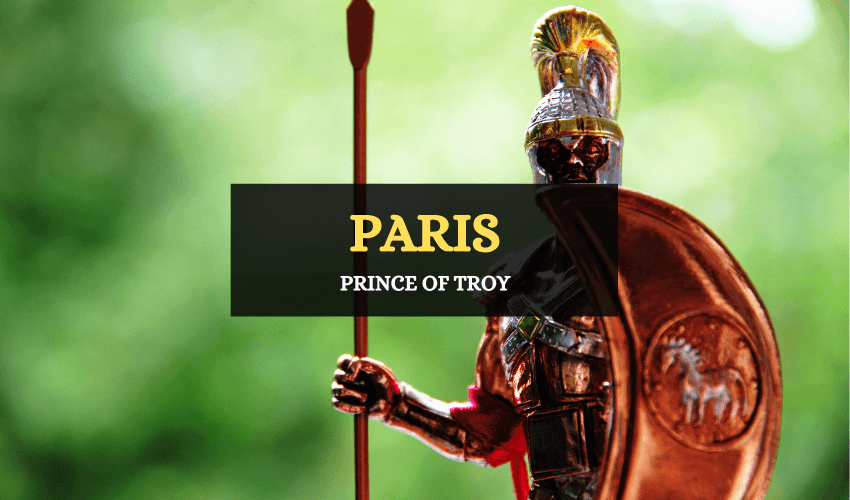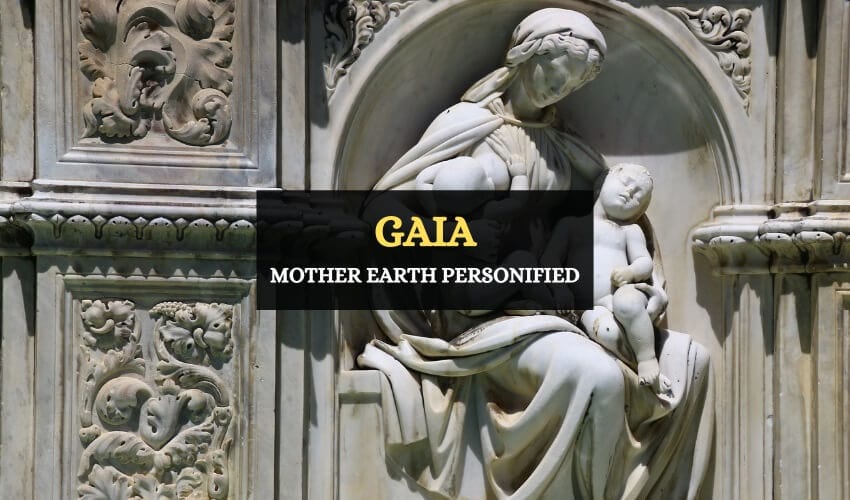
Table of Contents
The Earth goddess Gaia, also known as Gaea, was the first deity that came out of Chaos in the beginning of time. In Greek mythology, she is the personification of earth and the mother of all living things, but the story of the giver of life has more to it than just this. Here’s a closer look at Gaia and her symbolism.
Origins of Gaia
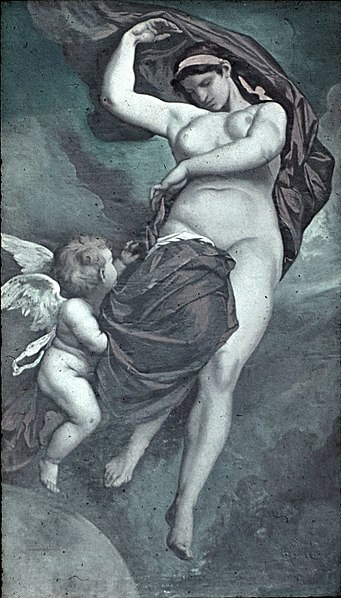
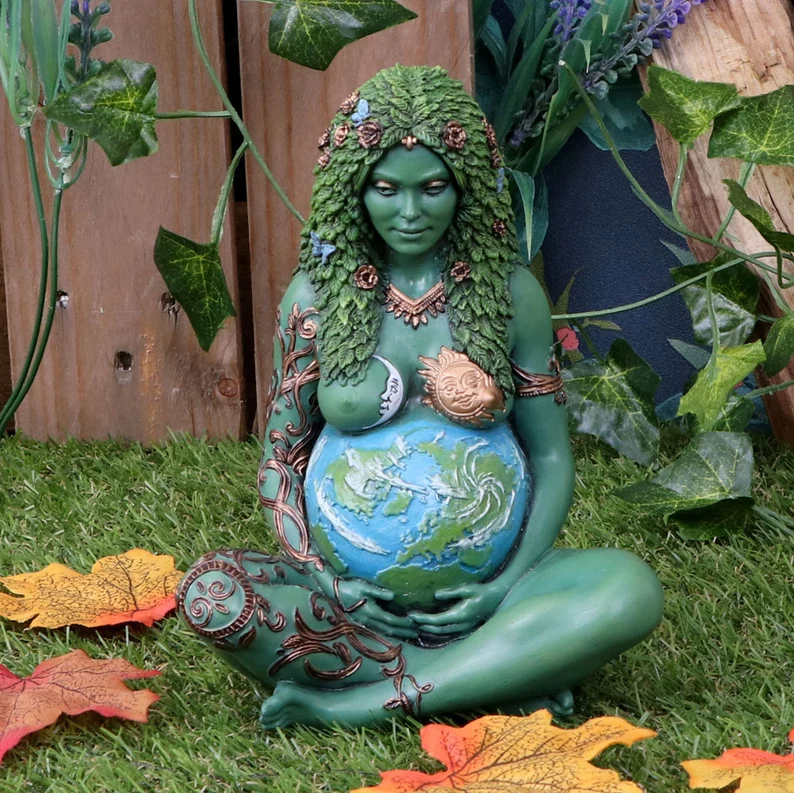
According to the creation myth, in the beginning there was only Chaos, who was nothingness and void; but then, Gaia was born, and life started to flourish. She was one of the primordial deities, the first gods and goddesses who were born from Chaos, and the presence of the celestial body on earth.
As the giver of life, Gaia was able to create life even without the necessity of sexual intercourse. She alone gave birth to her first three sons: Uranus, the personification of the sky, Pontos, the personification of the sea, and the Ourea, the personification of the mountains. Greek mythology’s creation myth also says that Mother Earth created the plains, the rivers, the lands and is responsible for creating the world as we know it today.
According to some sources, Gaia governed the universe before her sons, the Titans, took control over it. Some myths also say that Gaia was the mother goddess worshipped in Greece before the Hellenes brought in the cult of Zeus.
Gaia is said to be the mother of a series of beings in Greek mythology. Besides Uranus, Pontos, and Ourea, she was also the mother of the Titans and the Erinyes (The Furies). She was also the mother of Oceanus, Coeus, Creius, Hyperion, Iapetus, Theia, Rheia, Themis, Mnemosyne, Phoebe, Thetys, Cronus, the Cyclopes, Brontes, Steropes, Arges, Cottus, Briareus, and Gyges.
Popular Myths Involving Gaia
As Mother Earth, Gaia is involved in different myths and stories as an antagonist and as the source of life.
1- Gaia, Uranus, and Cronus
Gaia was the mother and wife of Uranus, with whom she had the Titans, the Giants, and several other monsters such as the Cyclopes and Typhon, the monster of 100 heads.
Since Uranus hated the Titans, he decided to imprison them in Gaia’s womb causing the goddess great pain and distress. Besides imprisoning the Titans, this prevented Mother Earth from having more children. Furious, Gaia decided to ally with her younger son Cronus, to end Uranus.
Cronus learned that his destiny was to overthrow Uranus as ruler of the universe, so with the help of Gaia he used an iron sickle to castrate Uranus and liberate his siblings. The blood that sprung out of Uranus’ genitals created the Erinyes, the nymphs and Aphrodite.
From then onwards, Cronus and the Titans governed the universe. Although Uranus’ reign was done, he continued to exist as the sky god.
2- Gaia against Cronus
After having helped her son dethrone Uranus, Gaia realized that Cronus’ cruelty was uncontrollable and left his side. Cronus and his sister Rhea were the parents of the 12 Olympian gods, making Gaia the grandmother of Zeus and the other main gods.
Cronus learned from Gaia’s prophecy that he was destined to suffer the same destiny of Uranus; for this, he decided to eat all his children.
Rhea and Gaia managed to trick Kronos into eating a rock instead of eating his younger son, Zeus. The goddess of the earth helped raise Zeus who would later free his siblings from their father’s belly and defeat Cronus in an almighty war to take control of the Olympus.
After having won the war, Zeus imprisoned many of the Titans in the Tartarus, an action which infuriated Gaia and opened the door to a new confrontation between Gaia and the gods.
3- Gaia against Zeus
Angered by Zeus’ imprisonment of the Titans in the Tartarus, Gaia birthed the Giants and the Typhon, who was known as the deadliest creature in Greek mythology, to overthrow the Olympians, but the gods won both battles and kept reigning over the universe.
In all these stories, Gaia showed her stand against cruelty and was commonly opposed to the ruler of the universe. As we have seen, she opposed her son and husband Uranus, her son Cronus, and her grandson Zeus.
Symbols and Symbolism of Gaia
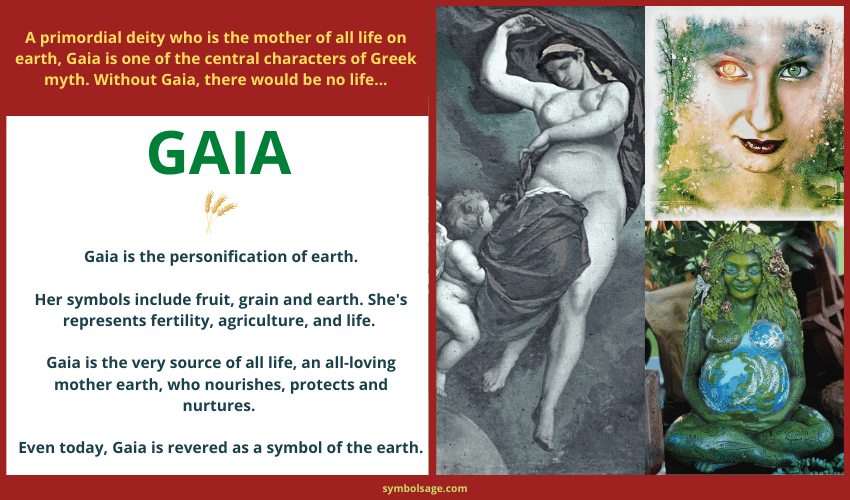
As the personification of the earth, Gaia’s symbols included fruit, grain and the earth. Sometimes, she’s depicted with the personification of the seasons, which indicates her position as a fertility and agriculture goddess.
Gaia herself symbolizes all life and fertility, as she’s the original source of all life on earth. She is the very heart and soul of the earth. Today, the name Gaia symbolizes an all-loving mother earth, who is nourishing, nurturing and protecting.
Nowadays, Gaia is also seen as a symbol of feminism and women’s power, since she was a powerful goddess. The idea of Gaia has detached itself from the borders of mythology; she is now considered a cosmic being that represents an intelligent and nurturing cosmic force who oversees the Earth. She continues to be a symbol of the earth and of all life on it.
Gaia in Science
In the 1970s, scientists James Lovelock and Lynn Margulis developed a hypothesis that proposed that there were interactions and self-regulation between the different parts of the earth. This showed how the planet worked as one to preserve its own existence. For instance, the seawater is never too salty for life to exist, and the air is never too toxic.
Since it was considered a mother-like aware system of preservation, the hypothesis was later confirmed and turned into theory. It was named the Gaia hypothesis, after the goddess of Earth.
Below is a list of the editor’s top picks featuring Gaia goddess statue.
Gaia’s Significance in the World
As the mother from whom the Earth and all life sprung from, Gaia’s role in Greek mythology is paramount. Without her, there wouldn’t be any Titans or Olympians, so it is safe to say that Greek mythology stands on Gaia’s fertility.
The representations of Gaia in art normally portray a motherly woman symbolizing fertility and life. In pottery and paintings, she is normally seen wearing a green robe and surrounded by her symbols – fruits and grains.
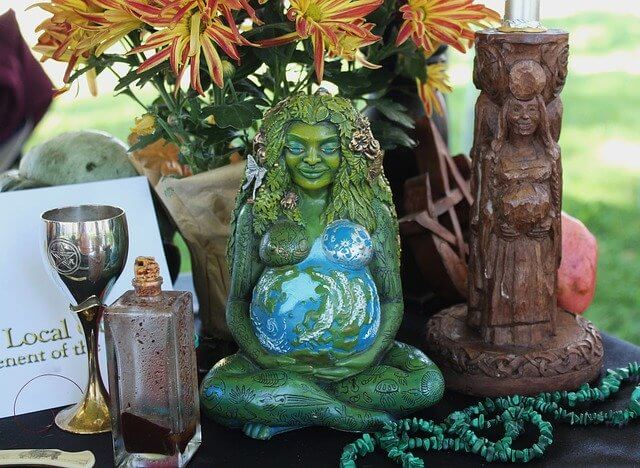
To many modern pagans, Gaia is one of the most important deities, representing earth itself. Called Gaianism, the belief is a philosophy and an ethical worldview, which focuses on honoring and respecting the earth, respect all life and reduce the negative impact on earth.
Gaia Facts
It means land or earth.
Her husband is Uranus, who is also her son.
She was a primordial deity who came from Chaos.
Gaia had numerous children, but perhaps her most famous children are the Titans.
Some myths say that she, along with Chaos and Eros, came out of a cosmic egg, like the Orphic Egg. Other myths say that these three beings had existed side by side since time began.
In Brief
First, there was Chaos, and then there was Gaia and life thrived. This primordial deity shows up as one of the foremost figures in Greek mythology. Wherever there was cruelty, Mother Earth stood up for those who needed it. The earth, the sky, the rivers, the seas, and all the traits of this planet that we so much enjoy were created by this fantastic and almighty goddess. Gaia continues to be a symbol of the earth and of our connection to it.







